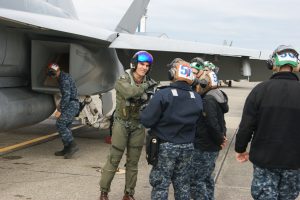Great leaders know how to focus.
A wonderful by-product of coaching is the exposure to new industries and the opportunity to learn about leadership in different arenas. The perspectives have been fascinating, and I want to share a lesson from one of those recent conversations.
Brett is a United States Naval Academy graduate and Naval Aviator. For the last several years, he has flown the EA-18G Growler. The Growler is an airborne electronic attack (AEA) aircraft; it operates from either an aircraft carrier or from a land base. Brett remains in active service and is currently serving in an acquisitions leadership role, but will return to the cockpit in a little over a year.
While there are striking differences between military aviation and industry, both environments share many of the same ideal leadership qualities. A leader exhibits focus, courage, passion, excellent communication skills and a sense of confidence.
Not surprisingly, though, circumstances arise in aviation that most of us in the civilian world never have to address. For instance, one of the things Brett spent many hours training for was in-flight emergencies. When Brett shared his perspective of training for a critical event during a flight, I was captivated.
The most effective training for emergencies ensures that pilots automatically begin processing checklists and systematically eliminating variables to uncover the root cause of the problem. When an actual emergency arises, processing is best done efficiently and unemotionally.
During simulated and actual emergency situations, Brett became acutely aware of the volume of information the pilot must manage. Once an issue is identified, the air-traffic controller will start to immediately (and necessarily) send options to the pilot and to the other aircraft in the area to clear a path for landing. While the air-traffic controller is attempting to help the pilot as much as possible, he or she might never be able to grasp the current state of the aircraft and pilot. At this same time, the pilot can only handle the immediate decisions and needs to prioritize instantly. They are taught, when they need to pay attention to the aircraft first, to request, “Tower, Standby.”
Brett indicated this method of focusing is a necessary and healthy way to concentrate on the most important tasks at hand to make the best decisions. It’s called detaching, a concept discussed by Jocko Willink, former Navy SEAL and cofounder of Echelon Front, where he is a leadership instructor, speaker, and executive coach.
In an article for Forbes magazine, Willink indicates that “one of the key qualities a leader must possess is the ability to detach from the chaos, mayhem, and emotions in a situation and make good clear decisions based on what is actually happening” Schawbel, Dan. (2017, Jan 23). Jocko Willink: Career Advice from a Former Navy Seal.
By requesting, “Tower, Standby” the pilot acknowledges the situation and intentionally detaches. This allows him to focus on the most urgent needs while respectfully communicating, “I need the information you are providing, but I can’t presently process it.” Meaning, if I don’t get this aircraft (or whatever’s going on with it) under control, there will be no need for the information you are trying to provide.
Now, I don’t know what it’s like to fly an airplane. And the stressful decisions I’ve made or been a part of making over the years cannot rival an aircraft emergency. But I can tell you that great leaders have a way of identifying the most pressing need and detaching when necessary.
When leaders aren’t effectively able to detach, there is a tendency for emotional outbursts and ineffective communication. I remember vividly the day a leader completely lost control in a meeting and screamed at all attendees. The behavior immediately halted any chance at productivity during that time.
Conversely, I witnessed a great example of detaching in a president that would regularly utilize an off-site location when processing a large amount of financial data. It was common for him to take a day (or two) during the 4th quarter and work in a different office as he analyzed budgets and planned for the upcoming year.
Information processing in our daily lives may not be as extreme as restarting a stalled aircraft at 10,000 feet or attempting to make an emergency landing on an aircraft carrier, but we are bombarded with information on a regular basis. When you don’t have the opportunity to physically isolate yourself, how do you focus and effectively have the tower standby when critical times arise?
And how often would detaching and focusing with intent help you prioritize your tasks?
https://www.linkedin.com/in/holly-adams-54b1b914/
https://www.facebook.com/HollyAdamsConsulting/

Thank you for your service, Brett!



